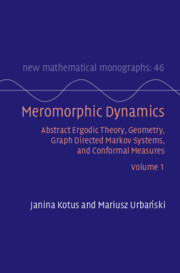 Meromorphic Dynamics
Meromorphic Dynamics Book contents
- Frontmatter
- Dedication
- Contents
- Contents of Volume II
- Preface
- Acknowledgments
- Introduction
- Part I Ergodic Theory and Geometric Measures
- 1 Geometric Measure Theory
- 2 Invariant Measures: Finite and Infinite
- 3 Probability (Finite) Invariant Measures: Basic Properties and Existence
- 4 Probability (Finite) Invariant Measures: Finer Properties
- 5 Infinite Invariant Measures: Finer Properties
- 6 Measure-Theoretic Entropy
- 7 Thermodynamic Formalism
- Part II Complex Analysis, Conformal Measures, and Graph Directed Markov Systems
- References
- Index of Symbols
- Subject Index
7 - Thermodynamic Formalism
from Part I - Ergodic Theory and Geometric Measures
Published online by Cambridge University Press: 20 April 2023
- Frontmatter
- Dedication
- Contents
- Contents of Volume II
- Preface
- Acknowledgments
- Introduction
- Part I Ergodic Theory and Geometric Measures
- 1 Geometric Measure Theory
- 2 Invariant Measures: Finite and Infinite
- 3 Probability (Finite) Invariant Measures: Basic Properties and Existence
- 4 Probability (Finite) Invariant Measures: Finer Properties
- 5 Infinite Invariant Measures: Finer Properties
- 6 Measure-Theoretic Entropy
- 7 Thermodynamic Formalism
- Part II Complex Analysis, Conformal Measures, and Graph Directed Markov Systems
- References
- Index of Symbols
- Subject Index
Summary
This chapter is devoted to some selected topics of geometric function theory. Its is entirely classical, meaning that no dynamics is involved. We deal here with Riemann surfaces, normal families and Montel's Theorems, extremal lengths, and moduli of topological annuli. The central theme is the various versions of the Koebe Distortion Theorems. These theorems form a beautiful, elegant, and powerful tool of complex analysis. We prove them and provide their many versions of analytic and geometric character. These theorems form an indispensable tool for nonexpanding holomorphic dynamics and their applications very frequently occur throughout the book, most notably when dealing with holomorphic inverse branches, conformal measures, and Hausdorff and packing measures. The version of the Riemann–Hurwitz Formula, appropriate in the context of transcendental meromorphic functions, which we treat at length in Volume 2, is a very helpful tool to prove the existence of holomorphic inverse branches and an elegant and probably the best tool to control the topological structure of connected components of inverse images of open connected sets under meromorphic maps. Our approach to the Riemann–Hurwitz Formula stems from that of Beardon's book on rational functions. We modify it to fit our context of transcendental meromorphic functions.
Information
- Type
- Chapter
- Information
- Meromorphic DynamicsAbstract Ergodic Theory, Geometry, Graph Directed Markov Systems, and Conformal Measures, pp. 192 - 246Publisher: Cambridge University PressPrint publication year: 2023